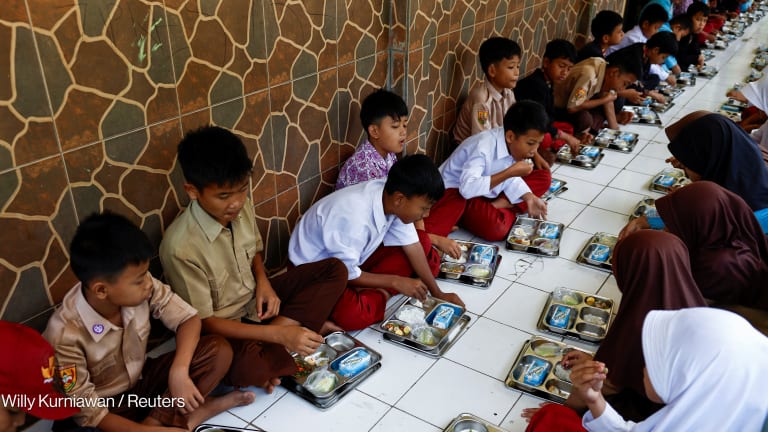Developing countries must play an active role alongside global partnerships to further cut child mortality and raise overall care, UNICEF said Jan. 22. The U.N. children’s fund noted in its State of the World’s Children Report 2008 that awareness of child mortality and other global health issues is at an all time high thanks to the efforts of new public-private initiatives such as the GAVI alliance that promotes vaccinations, and the Roll Back Malaria campaign. However, ?it has been argued that global partnerships are often donor- and commodity-driven rather than country- and people-centered,? the report said. Health programs must be integrated into strategies and policies that tackle the root causes of discrimination and exclusion, it said.
U.N. Secretary-General Ban Ki-moon has called on donors to respond quickly and generously to a USD 3.8 billion United Nations humanitarian appeal, stressing that for the poorest of the poor, early funding means the difference between life and death. Six weeks ago, the UN launched its Humanitarian Appeal 2008 ? ten consolidated appeals for specific emergencies ? seeking money to assist 25 million people in two dozen countries. To date, only one percent of the funds requested has been raised.
An international study into the situation in the Democratic Republic of Congo (DRC) shows that each month 45,000 of its citizens die from the consequences of war, disease and malnutrition. The fighting in the east of the DRC has claimed 5.4 million lives in the past ten years, more than any other conflict since World War II, according to a survey released by the International Rescue Committee (IRC) carried out with Australia’s Burnet Institute. Half the victims were children under five. Although the DRC is officially at peace, government forces are still fighting rebels in the east, leading to chronic shortages of food and medicine.
The World Food Program (WFP) is purchasing most of its food from developing countries in a “win-win” situation for both parties, according to the chief of the U.N. agency, which last year paid cash to poorer nations for a record 80 percent of its food. The world’s largest humanitarian organization, WFP bought 2.1 million metric tons valued at over USD 760 million from 69 developing countries in 2007, with Uganda as the largest supplier. The WFP has a policy of buying food locally when and where there is an abundance, but it avoids these markets at times of scarcity in order to avoid distorting prices.
The European Union’s executive arm adopted landmark proposals on Jan. 23 that will make the 27-nation bloc a world leader in the fight against climate change, but tradeoffs will include higher energy bills, Reuters reported. The European Commission approved detailed plans to cut planet-warming greenhouse gas emissions by one-fifth and set each EU state individual targets to produce one-fifth of all power from renewable sources like the wind and sun by 2020. Another goal was to ensure the bloc’s energy security as remaining fossils fuels become concentrated among fewer nations.
The Food and Agriculture Organization (FAO) has launched projects in five West African countries, considered to be among the world’s poorest, to help increase agricultural output and create new markets for products. Launched as part of the U.N. agency’s Trust Fund for Food Security, the projects are taking place in Guinea-Bissau, Liberia, Mali, Senegal and Sierra Leone, thanks to a USD 10 million contribution from the Italian Government. All five countries suffer from “alarming” levels of poverty and malnutrition, FAO noted in a news release, adding that that in some cases, up to 70 percent of the population is living below the poverty line.
U.N. Secretary-General Ban Ki-moon expressed dismay on Jan. 23 over a long-standing impasse in international talks meant to stop the spread of dangerous weapons worldwide and in outer space. In a speech to the Conference on Disarmament, The 65 member-state Geneva body has failed for a decade to reach the consensus needed to launch full negotiations. China and Russia are among those arguing that other issues should be discussed alongside the nuclear talks, including negotiations to prevent weapons being deployed in space.








